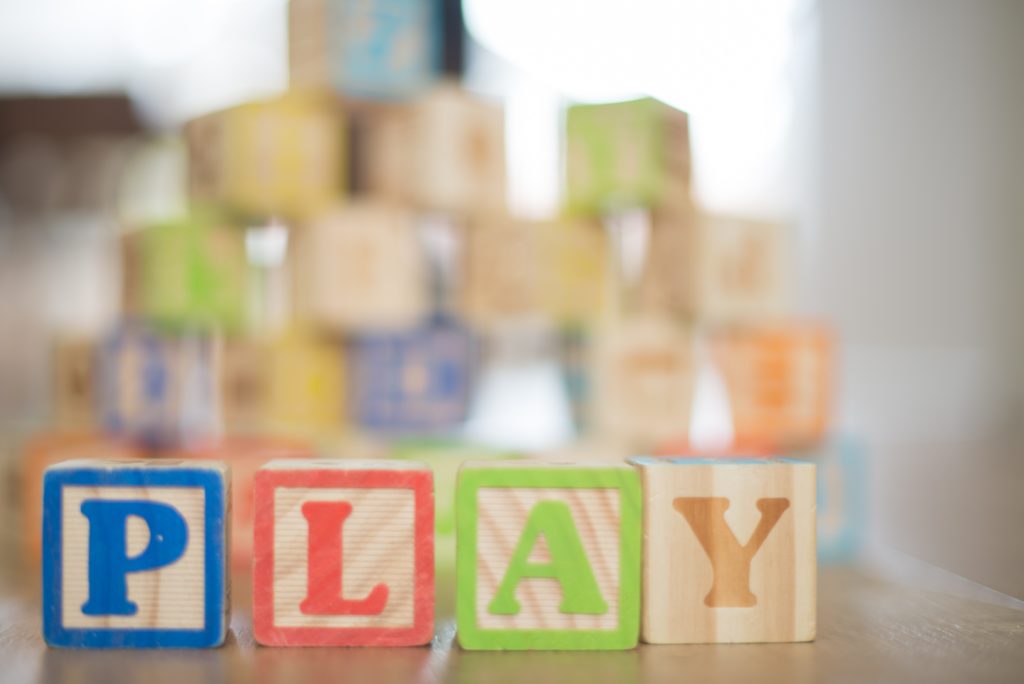You’re not even sure potty training is completely mastered for your preschooler, but you’re already feeling the intense pressure to make sure your child knows how to read.
School standards have changed over the years, and younger children are expected to do much more than they were in the past, including mastering reading at a younger age. So it’s natural if you’re feeling worried.
You may want to pull out flashcards, run drills, and sit at the kitchen table practicing letters every afternoon.
But this is boring and difficult, and may disengage your child from learning. We strongly encourage you to take a deep breath and let your child play.
Play?
Yep. Play.
How Play Helps Children Learn Reading Skills
Literacy skills involve higher order cognitive processes. We’re talking: imagining, problem solving, categorizing, and more. Dramatic play also involves these processes, and because it’s so enjoyable, your child will soak up those concepts in real ways that will transfer to reading skills.
In fact, one study found that children who used meta-play talk (managing play by stepping out of a role to explain something: “I’m the doctor, and you’re the patient”) had a higher level of story comprehension than children who didn’t. Pretend play is important!
Letters Are Symbols
Research has shown that pretend play impacts children’s emergent writing abilities.
Not only that, children are learning about symbolic representation — one object can represent something else. When they understand this, it’s not that hard to make the leap to understanding that letters are symbols that represent something else.
Eventually, your child will have to understand that a string of letters and words takes on a specific meaning. Pretend play will set her up with a rich cognitive foundation.
Communication
Play is all about communication. Your child has to talk about rules, adjust expectations out loud, discuss intentions, and more. This is narration and description, skills that your child will need as he learns to write clearly.
Self-Regulation
Your child will quickly learn she can’t grab toys from other friends, even when she really wants to. She’ll learn that toys need to be cleaned up without meltdowns, and that playtime needs to end. These lessons help her develop self-regulation, which is critical in reading. Reading requires focus, following a story from beginning to end, self-discipline to learn hard things, and more.
Literacy Is Incorporated Into Play
Children pretend to read while they play. They may mark up paper as a list or note. They may jot down someone’s order at their play restaurant, or send a letter to a pretend friend. Getting familiar with the concept of reading and writing in a fun way will help your child be better prepared to learn to read for meaning.
The Play Environment Is Important
The environment in which your child plays can benefit literacy skills in tremendous ways. When a play center is stocked with theme-related reading and writing materials, your child will be more familiar with language.
For example, at UDA Creative Arts Preschool in Draper, we have a play kitchen area. Nearby is a table set up like a restaurant. We include menus, price tags, labeled food containers, and more in the play area. This type of literacy-rich environment has been shown to increase children’s literacy behaviors through play — and to even provide gains in children’s knowledge about writing and recognizing print.
We regularly place labels around the room in our themed play areas and include plenty of writing materials in our literacy-embedded play centers. The children become comfortable imagining while incorporating literacy into their pretend games.
How Can You Encourage Literacy Skills Through Play at Home?
- Give your child a variety of props and objects to play with. You don’t have to go out and buy the whole toy store. It’s actually helpful for children to use different objects for different pretend items. A wooden play spoon can become a microphone. A handful of matchbox cars can become coins.
- Show your child how to substitute different items for different things, and then let them use their imagination with other items.
- Give your child new experiences. Take them to a different park than usual. Go to a museum, the library, the store, and more. When traveling, point out different things you notice. Giving children a variety of experiences helps them expand their play themes.
- Let your child play with writing materials while playing pretend. (You may want to keep a close eye so that pencil mark stays on paper!)
- Write labels around your play area: Cars, Dolls, Play Food, etc.
- Occasionally set up a themed play area, complete with labels: Turn your play kitchen into a restaurant, and make menus with your child. Have the cars go to a car wash, and make labels for soap, water, and more.
- Show your child how to make props with other items around the house: throw pillows can become thrones, a scarf can be a leash for a pretend pet.
- Leave books in the play area to encourage your child to incorporate reading into playing.
Everything we do at UDA Creative Arts Preschool in Draper, Utah revolves around play. Our children thrive in this environment, learning crucial skills that will help them in kindergarten and beyond. To learn more or schedule a tour of our preschool, give us a call at (801) 523-5930, or contact us online.


